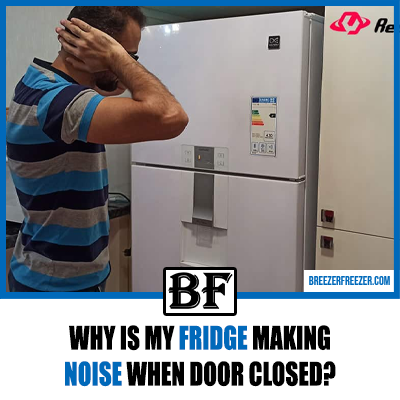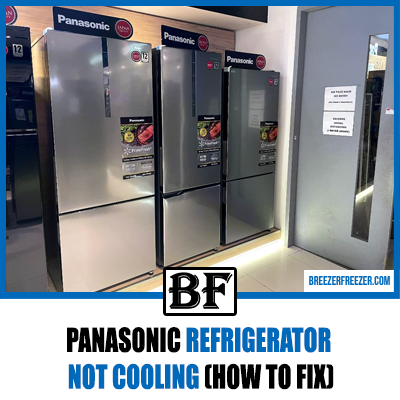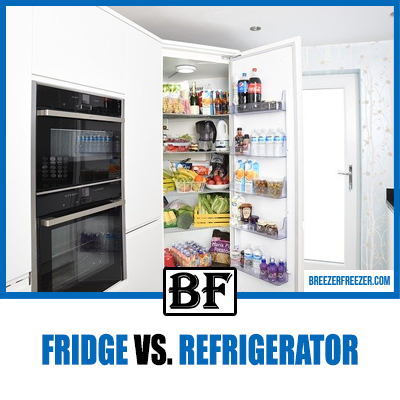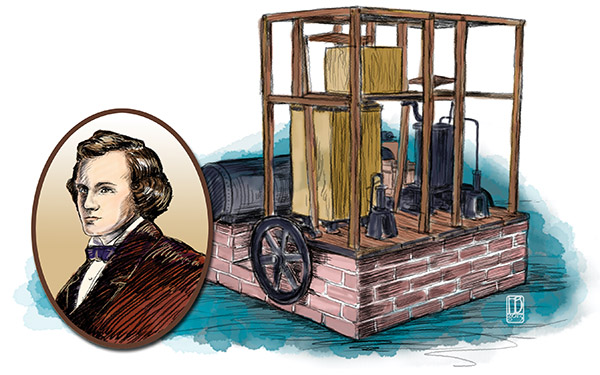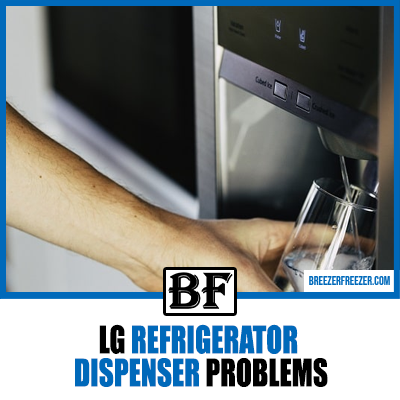Why Is My Fridge Making Noise When Door Closed? (9 Fixes!)
If your refrigerator is making noise when the door is closed, it’s important to understand that not all noises indicate a malfunction. However, abnormal noises can be a sign of an issue that needs addressing.
Common causes of unusual refrigerator noises include a defective or ice-obstructed evaporator fan motor, ice buildup, a faulty condenser fan, an unstable unit, a dirty condenser, a defective door hinge or door seal, temperature fluctuation, or poor airflow.
Quick Troubleshooting for a Fridge Door Closed Making Noises
| Probable Reason | Type of Noise | Solution |
| 1. Faulty Evaporator Fan Motor | Loud humming, squealing, rattling, or knocking | Substitute the defective evaporator fan motor |
| 2. Obstructed Evaporator Fan | Rattling | Thaw the ice surrounding the fan and refrain from overstuffing the fridge |
| 3. Ice Accumulation | Grinding | Thaw the ice in the freezer |
| 4. Damaged Condenser Fan | Grinding, knocking, or squealing | Substitute the faulty condenser fan |
| 5. Unstable Fridge (Imbalance) | Rattling or intense vibration | Stabilize the fridge and interior trays |
| 6. Dirty Condenser | Grinding or rattling | Clean the condenser and the entire fridge to eliminate dust |
| 7. Faulty Door Hinge or Seal | Squealing | Substitute the squeaky door hinge |
| 8. Fluctuating Temperature | Snapping, popping, or cracking | Modify the fridge temperature to stabilize conditions |
| 9. Inadequate Airflow (Insufficient Clearance) | Knocking or rattling | Create additional space around and inside the fridge |
Normal vs. Abnormal Fridge Noises
Refrigerators can produce a variety of sounds, some of which are normal and others that may indicate a problem.
Normal Fridge Noises
- Soft humming or low whirring: This is common in new fridges due to new and unlubricated parts.
- Low hissing: This can occur when water drips or when the refrigerant gas is flowing.
- Water gurgling: This sound can be heard when water moves up the drain pipe, the refrigerant is running, or ice is melting.
- Low snapping, popping, or cracking: These sounds can occur due to the contraction and expansion of plastic parts in the fridge due to temperature fluctuations.
- Low chirping or clicking: These sounds can be heard when the fridge starts to run or when the door is closed and the contact points rub against each other.
- Low buzz: This can be heard when the ice maker fills with water or when the water dispenser is running.
- Creaking/Cracking: This sound often occurs when ice is ejecting from the ice dispenser.
- Whistling or blowing: This sound can occur when the door is closed due to the vibration of the seal or when the fan runs.
- Bubbling: This sound usually indicates the refrigerant gas is flowing, which is normal.
Abnormal Fridge Noises
- Rattling: This can occur when the evaporator fan is blocked by ice or due to a failing defrost system.
- Grinding: This can be caused by excessive ice buildup blocking the fans or a failing condenser fan.
- Squeaking: This can occur when the fridge door hinge is faulty.
- Knocking: This can be a sign of an overheating fridge fan motor or a faulty one.
- Loud bang: This can occur when the water pressure is too high.
- Loud vibration: This can occur if the fridge is resting on an unstable surface.
- Loud hum or pulsating: This can indicate a faulty condenser fan.
- Scraping or loud whirring: This can occur when ice buildup around the fans causes the running fan to crash against it.
- Loud chirping or squealing: This can be a sign of a malfunctioning motor fan.
Troubleshooting Abnormal Fridge Noises
If your fridge is making abnormal noises, here are some potential fixes:
- Replace the evaporator fan motor if it’s faulty.
- Defrost the ice around the fan and avoid overloading the fridge if the evaporator fan is obstructed.
- Defrost the ice mass in your freezer if there’s ice buildup.
- Replace the faulty condenser fan if it’s defective.
- Stabilize the fridge and the inside trays if the unit is unstable.
- Clean the condenser and entire fridge to get rid of dust if the condenser is dirty.
- Replace the squeaky door hinge if the door hinge or door seal is faulty.
- Adjust the fridge temperature to normalize the conditions if there’s temperature fluctuation.
- Create more room around the fridge and interiorly if there’s poor airflow.
Normal Sounds from Various Fridge Brands
Samsung: Normal sounds from a Samsung fridge include a gurgling or low hissing sound when the refrigerant is flowing, and a low buzz when the compressor is running. Other sounds include a snapping or popping noise when the plastic parts contract and expand. However, a loud beep indicating a high temperature, a squeaking sound indicating a faulty door hinge, and a loud grinding or vibrating noise indicating a faulty evaporator fan should be cause for concern.
Whirlpool: Whirlpool fridges typically produce a low buzz when water is dispensing, a gurgling or dripping sound when ice is melting, and a hissing sound when the refrigerant is flowing. However, if the fridge makes a loud humming or pulsating noise, it could mean that the ice maker’s water supply is off. If there’s a vibrating noise, the fridge might be unstable.
Kenmore: Kenmore fridges, like Whirlpool fridges, make a low buzz when the water dispenser is running and a dripping sound when ice is melting. A high-pulsating sound could indicate that the ice maker’s water supply is off.
Bosch: Bosch fridges make a bubbling or low humming sound when the refrigerant is flowing, a rumbling noise when ice drops into the ice maker, and a droning sound when the motor is running. However, if the fridge vibrates loudly, it could be unstable, or the trays inside might be shaky.
LG: Normal LG fridge sounds include clicking, gurgling, popping, dripping, low pulsating, sizzling, and whoosh sounds. However, if the refrigerator freezer is humming loudly, it could indicate a faulty compressor. If it vibrates loudly, it might be unstable.
In conclusion, understanding the different types of noises your fridge canmake can help you troubleshoot and fix issues before they become serious.
However, if the noise persists or if you’re unsure about the cause, it’s always best to consult with a professional technician.
